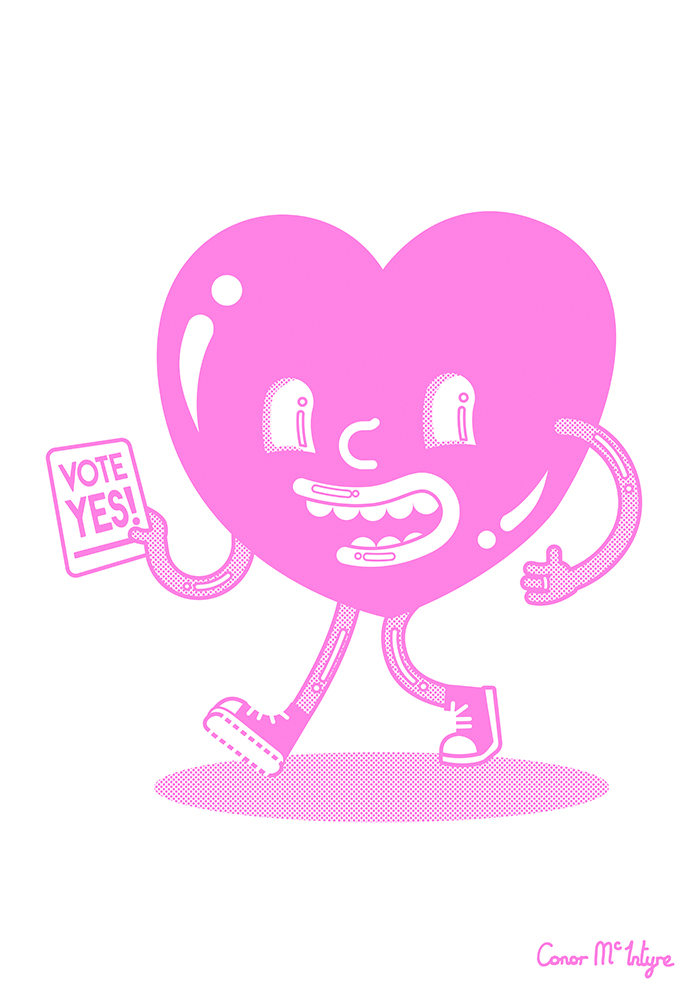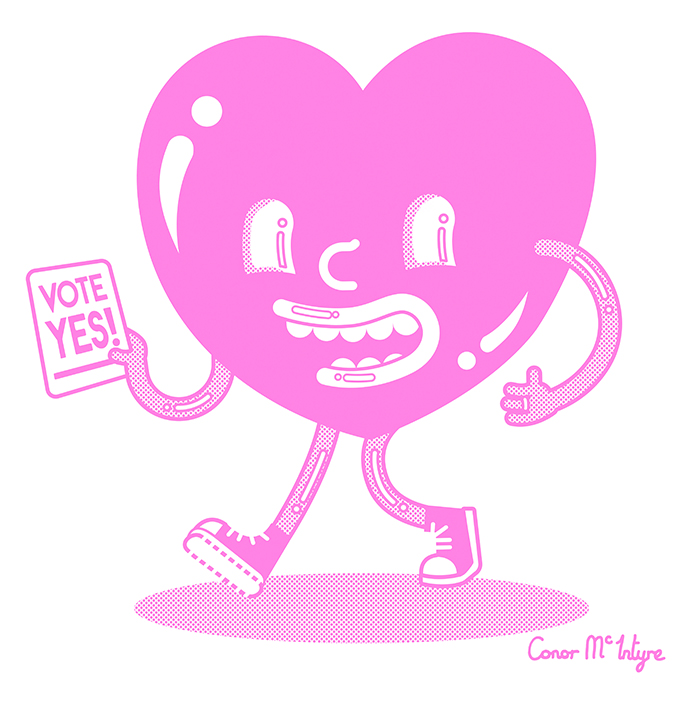In the first of a three-part feature, Aidan Hanratty looks at reasons to vote Yes in the forthcoming marriage referendum.
It’s hard to know where to begin on the topic of same-sex marriage (SSM). Between op-eds and letters to The Irish Times, it seems enough words have been written on the subject that any more might be considered a waste. When you see some of the ludicrous guff written on social media, however, it’s hard to ignore the urge to state your case.
A friend recently told of how her five-year-old daughter was against SSM, since obviously boys should marry girls (and vice versa). It seems bizarre that anyone older than that would continue with that logic without interrogating it just a little bit.
Without going down the dictionary route, it’s important to establish that marriage is a legal contract. As it stands, it’s a legal contract between a man and a woman, but in essence it’s a union of two people who come together for a variety of reasons: for sexual exclusivity, for companionship, to have and raise children, or not, for taxation purposes. Looking at that list, and acknowledging that it is far from exhaustive, it’s hard to determine that it should be exclusively designated for a man and a woman.
The supposedly ideal nuclear family of mum, dad and any number of children, is in no way proscriptive or indeed representative of life in Ireland. Not everyone gets married to have kids, for one thing. It’s that simple. Furthermore, not everyone who gets married can have kids. For health or financial reasons it’s just not always possible. These marriages, however, are no more valuable (or valid, since it’s just a legal contract) than that of anyone else. Any hint to the contrary would be at best insulting, at worst inflammatory.
I’m a straight man. I got married in 2011 to my (straight) wife, and right now we’re expecting our first child. We didn’t get married to have children, but we got married and we hope to have at least one child. I don’t think for any reason that if the legal definition of marriage was changed that our marriage would be altered in any way. I just can’t see it. In all honesty I can’t even fathom why we’re any more special than the couple down the street who want to but can’t marry right now simply by virtue of our birth and orientation. We just happened to be born at the right time, I suppose.
I should add that we got married in a church. There were a lot of reasons for that, but I won’t go into that here and now. What’s important to note is that we didn’t have to, and that, again, our marriage wouldn’t be any different if we hadn’t. To suggest otherwise is the height of impertinence. Marriage is not now and wasn’t always simply a religious issue. Moreover, the fact that Catholicism is the major religion at play in this debate belies the existence not only of atheists or agnostics in Ireland but also of those of non-Christian beliefs. That said, there are several branches of Christianity in the US that look favourably upon same-sex unions, Episcopalians and Unitarians, for example.
It’s easy to reach for the bible and identify passages here and there that condemn homosexuality as a sin. In Leviticus 18, God commands Moses to lay down His law to the Israelites: don’t sleep with any relatives or in-laws, don’t sleep with men (presumably lesbian sex was just unthinkable as that might assume female agency or sexuality) and don’t sleep with animals. Parts one and three are reasonable enough, but part two is undoubtedly questionable. Beyond these points, however, He commands His believers/followers not to sleep with a woman “during the uncleanness of her monthly period”. Should we legislate for this? Or is it utter nonsense?
A book later, Leviticus 19, is where God lays down some serious no-nos. He says not to curse the deaf or put a stumbling block in front of the blind, which is cool, but then says not to show favouritism to the poor, which is not. He says a man can be punished if he sleeps with a slave girl who has been promised to another man, so presumably all those rules about who people could and could not sleep with or marry were only for the free folk, not those slaves, who aren’t even worthy of divine legislation. They’re just chattel, sure.
Then he says not to cut the hair at the sides of your head or clip off the edges of your beard, and certainly no tattoos. In Deuteronomy advocates wholesale religious war, from killing anyone – be it brother, sister, child – who speaks or even dreams of worshipping another god to killing the entire inhabitants of a city that does not believe in Him. (As a side note, let’s not forget that as the Bible tells it, we’re all products of incest, the murderer Cain having married his sister Awan. And when it comes to unusual family arrangements, we need look no further than Jesus, Mary and Joseph.)
Jesus commanded his followers to “love god and love thy neighbour”. It’s very hard to see the love through a lot of the bitterness and hatred spewed in this debate.
Whether or not this referendum is carried, same-sex couples will continue to exist. Those with children won’t disappear, and others are sure to adopt or bear children in future. Defeating this referendum in the name of protecting hypothetical children from being denied a mother or father will only serve to disenfranchise these very real, living and breathing children. It’s all well and good to say that same-sex couples can register civil partnerships, but advocacy group Marriage Equality has identified some 160 statutory differences between these and marriages. Simply put, our gay brothers and sisters deserve better.
One doesn’t have to be religious to be moral, so in the increasingly secular society we have here in Ireland we should be able to make moral decisions independent of religious teaching. The nature of a constitution is that it can be amended and tweaked not to suit popular thinking but to welcome an ever-more enlightened approach to life in a society in flux. Aidan Hanratty
The illustration by Conor McIntyre is available to buy through Damn Fine Print in Block T between 9 and 7 every day for a suggested donation of €5 per print or €10 for a tote bag. All proceeds go to The Yes Equality Campaign.







